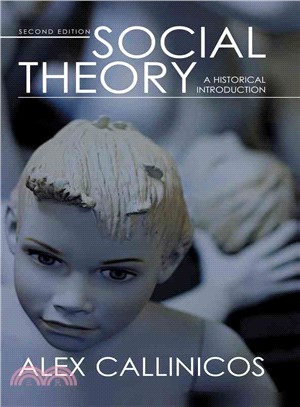| FindBook |
有 1 項符合
SOCIAL THEORY - A HISTORICAL INTRODUCTION的圖書 |
 |
Social Theory - A Historical Introduction 2E 作者:ALEX CALLINICOS 出版社:BLACKWELL PUB 出版日期:2007-02-24 |
| 圖書館借閱 |
| 國家圖書館 | 全國圖書書目資訊網 | 國立公共資訊圖書館 | 電子書服務平台 | MetaCat 跨館整合查詢 |
| 臺北市立圖書館 | 新北市立圖書館 | 基隆市公共圖書館 | 桃園市立圖書館 | 新竹縣公共圖書館 |
| 苗栗縣立圖書館 | 臺中市立圖書館 | 彰化縣公共圖書館 | 南投縣文化局 | 雲林縣公共圖書館 |
| 嘉義縣圖書館 | 臺南市立圖書館 | 高雄市立圖書館 | 屏東縣公共圖書館 | 宜蘭縣公共圖書館 |
| 花蓮縣文化局 | 臺東縣文化處 |
|
|
- 圖書簡介
The second edition of this remarkably lucid text, provides a wide-ranging historical introduction to social theory. The new edition preserves, and further enhances, the book’s striking qualities – its clarity, reliability, comprehensiveness and scholarship. The theorists treated include Montesquieu, Adam Smith and the Scottish Enlightenment, Hegel, Marx, Tocqueville, Maistre, Gobineau, Darwin, Spencer, Kautsky, Nietzsche, Durkheim, Weber, Simmel, Freud, Lukács, Gramsci, Heidegger, Keynes, Hayek, Parsons, the Frankfurt School, Lévi-Strauss, Althusser, Foucault, Habermas, Bourdieu, Beck, and Giddens.Callinicos examines the ways in which social theory grew out of the eighteenth century Enlightenment, a time when societies emerging in the West ceased to invoke the authority of tradition to validate themselves, instead looking to scientific knowledge to justify their mastery of the world. He traces social theory’s connections with central themes in modern philosophy, with the development of political economy, and with the impact of evolutionary biology on social thought. The book has been carefully updated to ensure that it engages with the most up-to-date debates in social theory, and concludes with a substantial new chapter. Here Callinicos assesses the significance of contemporary debates about globalization, including the recent re-emergence of critiques of capitalism and imperialism in the work of Michael Hardt, Toni Negri, Luc Boltanski, Eve Chiapello, David Harvey, Robert Brenner, Giovanni Arrighi, and Slavoj Žižek. This updated version of a widely praised text will be essential reading for students of politics, sociology and social and political thought.
* Second edition of a widely respected textbook * Authored by a scholar of high renown, with a proven track record * Written in the same beautifully clear, reliable and accessible style as the first edition. * Updated throughout, with considerably more attention given to globalization, postmodernity and feminist ideas, to make the book substantially useful on social theory courses - 作者簡介
Alex Callinicos is Professor of European Studies at Kings College, London.
- 目次
* Introduction * 1. The Enlightenment * 1. 1 Prehistory * 1. 2 The concept of modernity * 1. 3 A moral science * 1. 4 The development of social theory * 1. 5 Inner strains * 2. Hegel * 2. 1 Reconciling modernity * 2. 2 The labour of the negative * 2. 3 The debate over modernity * 3. Liberals and Reactionaries * 3. 1 Post-revolutionary debates * 3. 2 Agonistic liberalism: Tocqueville and Mill * 3. 3 Providence and race: Maistre and Gobineau * 4. Marx * 4. 1 The adventures of the dialectic * 4. 2 History and capitalism * 4. 3 Class struggle and revolution * 5. Life and Power * 5. 1 Evolution before and after Darwin * 5. 2 Two evolutionists: Spencer and Kautsky * 5. 3 Nature as the will to power: Nietzsche * 6. Durkheim * 6. 1 Social evolution and scientific objectivity * 6. 2 Society as a moral reality * 6. 3 Meaning and belief * 7. Weber * 7. 1 Prussian agriculture and the German state * 7. 2 Science and the warring gods * 7. 3 History and rationalization * 7. 4 Liberal imperialism and democratic politics * 8. The Illusions of Progress * 8. 1 The strange death of liberal Europe * 8. 2 Objectivity and estrangement: Simmel * 8. 3 The self dissected: Freud * 8. 4 Memories of underdevelopment: Russian intellectuals and capitalism * 9. Revolution and Counter-Revolution * 9. 1 Hegelian Marxism: Lukács and Gramsci * 9. 2 Heidegger and the conservative revolution * 10. The Golden Age * 10. 1 Theories of capitalism: Keynes and Hayek * 10. 2 Functionalist sociology: Talcott Parsons * 10. 3 Despairing critique: the Frankfurt school * 11. Crack-Up? * 11. 1 The 1960s and after * 11. 2 Structure and subject: Lévi-Strauss and Althusser * 11. 3 Nietzsche’s revenge: Foucault and poststructuralism * 11. 4 Carrying on the tradition: Habermas and Bourdieu * 12. Debating modernity and postmodernity * 12. 1 Postmodernity? * 12. 2 Modernity and capitalism * 12. 3 Reason and nature * 12. 4 Theory and practice * 12. 5 Universal and particular * 12. 6 Beyond capitalism? * 13. Changing the subject: globalization, capitalism, and imperialism * 13. 1 Much ado about globalization * 13. 2 The social as networks ... or as nothing * 13. 3 Back to capitalism - and imperialism? * 13. 4 The debate resumed * Further Reading * Index
|











